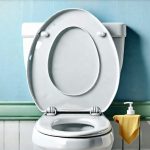The seemingly innocuous act of eating – something we all do multiple times daily – can sometimes trigger an unexpectedly urgent need to use the restroom for some individuals. While often dismissed as a quirk or simply attributed to a sensitive bladder, a growing awareness exists around the phenomenon of bathroom urgency being exacerbated by specific sensory inputs, particularly auditory stimuli related to others’ eating habits. This isn’t necessarily about food intolerance or digestive issues; it’s frequently linked to complex neurological pathways and psychological associations that connect sounds – specifically those associated with chewing, crunching, or slurping – to a feeling of needing to void the bladder. Understanding this connection requires delving into how our brains process sensory information, the role of autonomic nervous system responses, and potential underlying psychological factors.
This is a surprisingly common experience, though often unspoken due to embarrassment or the difficulty in explaining such an unusual reaction. Many individuals report experiencing a sudden urge to urinate when exposed to the sounds of others eating – in open-plan offices, family dinners, cafeterias, or even simply sitting near someone chewing gum. The intensity can range from mild discomfort prompting a quick bathroom visit to debilitating urgency requiring immediate action. It’s important to recognize that this isn’t merely “being annoyed” by loud eaters; it’s a physiological response triggered by the auditory stimulus, and understanding its roots can help individuals cope with and potentially manage this often-frustrating condition. We will explore the potential mechanisms behind this phenomenon, as well as strategies for mitigating its impact on daily life.
The Neurological Basis of Auditory Triggered Urgency
The connection between eating sounds and bathroom urgency isn’t a straightforward one; it’s rooted in complex neurological interplay. Our brains are constantly processing an enormous amount of sensory information, filtering what’s important and suppressing what isn’t. However, certain stimuli can bypass these filters and directly activate the autonomic nervous system – the part responsible for involuntary functions like heart rate, digestion, and bladder control. Sounds associated with eating, even if not consciously bothersome, can be interpreted by the brain as a signal of potential threat or discomfort, triggering a cascade of physiological responses.
This response is closely linked to the cephalic phase of digestion – a preparatory stage that begins even before food enters your mouth. When we see or hear food, our brains start anticipating consumption and preparing the digestive system. This includes increased salivation, stomach acid production, and changes in intestinal motility. For individuals experiencing auditory-triggered urgency, this anticipatory response may inadvertently include signals to the bladder, leading to a feeling of needing to urinate. The sounds themselves might act as a conditioned stimulus, associating the act of eating (and therefore potential food intake) with an impending need for voiding.
Furthermore, mirror neurons—neurons that fire both when we perform an action and when we observe someone else performing the same action—might play a role. When witnessing someone eat (and hearing their associated sounds), our mirror neuron system may partially activate our own digestive processes and related physiological responses, including bladder function. This effect is likely heightened in individuals with a pre-existing sensitivity to bodily sensations or those prone to anxiety. The brain doesn’t always distinguish between experiencing something ourselves and observing it happening to others. If underlying gut issues are contributing factors, consider hidden gut issues for a more in-depth look.
The Role of Misophonia and Sensory Processing Sensitivity
Misophonia, literally “hatred of sound,” is often cited in discussions about this phenomenon, although the connection isn’t universally present. While not everyone experiencing auditory-triggered urgency has misophonia (a neurological condition characterized by intense emotional reactions to specific sounds), there’s significant overlap. Individuals with misophonia experience disproportionate distress – ranging from annoyance to rage – when exposed to trigger sounds, and these triggers often include oral motor sounds like chewing, lip smacking, or swallowing. The intensity of the reaction can be profoundly disruptive, leading to social isolation and emotional turmoil.
However, even without a formal diagnosis of misophonia, many individuals exhibit sensory processing sensitivity (SPS). SPS is a trait where people experience sensory information more intensely than others. This doesn’t mean they are “overly sensitive” in a negative way; it simply means their nervous systems process stimuli with greater depth and detail. Those with higher levels of SPS may be more likely to notice subtle sounds, feel overwhelmed by noisy environments, and experience stronger emotional responses to sensory input – including the auditory cues associated with eating. This increased sensitivity can make them particularly vulnerable to experiencing bathroom urgency in response to these sounds.
Sensory processing differences can also contribute to a heightened awareness of internal bodily sensations—interoception. Individuals who are highly attuned to their bodies may be more likely to notice even subtle changes in bladder pressure or fullness, and this awareness could be amplified by the auditory stimulus. This creates a feedback loop where the sound triggers an initial sensation, which is then magnified by increased interoceptive awareness, leading to a stronger urge to urinate. It’s not necessarily about hating the sounds; it’s about experiencing them with heightened intensity. Sometimes tests that back up sensory sensitivities can help understand these connections.
Autonomic Nervous System Dysregulation and Anxiety
The autonomic nervous system (ANS) plays a crucial role in regulating bodily functions without conscious effort. It has two main branches: the sympathetic nervous system (responsible for “fight or flight” responses) and the parasympathetic nervous system (responsible for “rest and digest”). A healthy ANS maintains balance between these two systems. However, chronic stress, anxiety, or underlying medical conditions can lead to autonomic dysregulation, where this balance is disrupted.
For individuals experiencing auditory-triggered urgency, a hyperactive sympathetic nervous system might be contributing factor. The sound of eating could be perceived as a stressful stimulus – even subconsciously – triggering the release of adrenaline and cortisol. This leads to increased heart rate, heightened alertness, and potentially constriction of bladder muscles, increasing the sensation of urgency. Conversely, a dominant parasympathetic response could also play a role in some individuals—the cephalic phase of digestion heavily relies on parasympathetic activation, and an exaggerated response may directly stimulate bladder function.
Anxiety is often intertwined with this phenomenon. Pre-existing anxiety disorders or even general anxieties about social situations can exacerbate the experience. The fear of having an accident in public, for example, could amplify the urgency and create a vicious cycle where anticipation of the sound triggers anxiety, which then intensifies the physiological response. Addressing underlying anxiety through therapy or stress management techniques may help to reduce the frequency and intensity of these episodes. Managing the emotional component is often as important as understanding the neurological mechanisms. Understanding pain after eating can also provide insights into bodily responses during digestion.
Practical Strategies for Coping
While there’s no one-size-fits-all solution, several strategies can help mitigate auditory-triggered urgency:
- Identify Triggers: Pinpoint specific sounds that are most likely to trigger your urgency. Is it crunching? Slurping? Certain textures or foods?
- Minimize Exposure: Where possible, reduce exposure to triggering sounds. This might involve using noise-canceling headphones, choosing quieter dining environments, or politely requesting that others modify their eating habits (if appropriate).
- Distraction Techniques: When exposed to triggering sounds, try to redirect your attention. Engage in mental exercises, focus on breathing, or mentally rehearse calming scenarios.
- Bladder Training: Work with a healthcare professional to explore bladder training techniques, which involve gradually increasing the interval between bathroom visits to improve bladder capacity and control. (Note: This is not medical advice; consult a doctor.)
- Mindfulness and Relaxation: Practice mindfulness meditation or other relaxation techniques to reduce overall anxiety levels and promote autonomic nervous system balance.
- Professional Support: If the urgency significantly impacts your quality of life, consider seeking support from a therapist specializing in anxiety or sensory processing issues.
For those exploring diagnostic options, understanding GI diagnostics can be helpful. To plan meals around digestive comfort, explore steady digestion eating templates. You might also benefit from daily eating maps to create predictable comfort. Finally, consider what digestive tests are covered by insurance.
Ultimately, understanding that this is a neurological phenomenon – not a personal failing – is the first step toward managing it effectively. It’s about recognizing the connection between sounds and bodily responses and finding strategies to navigate this complex interplay with greater ease and control.


















